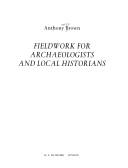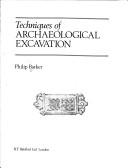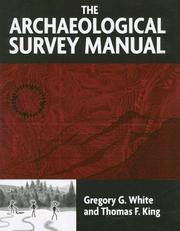| Listing 1 - 10 of 13 | << page >> |
Sort by
|

ISBN: 0713448415 0713448423 9780713448429 Year: 1987 Publisher: London: Batsford,
Abstract | Keywords | Export | Availability | Bookmark
 Loading...
Loading...Choose an application
- Reference Manager
- EndNote
- RefWorks (Direct export to RefWorks)
Archaeology --- Archéologie --- Fieldwork --- Recherche sur le terrain --- Archéologie --- Fieldwork. --- Archaeology - Fieldwork
Book
ISBN: 9782355180750 235518075X 2355180555 Year: 2018 Publisher: Drémil-Lafage: Mergoil,
Abstract | Keywords | Export | Availability | Bookmark
 Loading...
Loading...Choose an application
- Reference Manager
- EndNote
- RefWorks (Direct export to RefWorks)
"Confronté à une découverte d'objet archéologique, le fouilleur ne sait pas toujours comment l'interpréter. Avec quels outils le déterminer ou le classer ? Peut-on caractériser un site à partir de l'analyse de ses objets ? Qu'apportent les analyses quantitatives et qualitatives ? Ce petit manuel répond à ces interrogations et à bien d'autres questions que peut se poser un archéologue face à un objet.0Ecrit d'abord pour les étudiants, mais plus largement pour toute personne envisageant une analyse d'objet archéologique, il se présente comme une introduction à l'étude du mobilier. Sont abordés successivement les aspects méthodologiques, les interrogations théoriques, les classements typologiques, les problèmes de quantification et d'échantillonnage, et enfin les méthodes d'étude et d'illustration, sans oublier l'interprétation générale des résultats et l'apport du spécialiste dans le cadre d'une publication."--Cover, page 4
Objets archéologiques. Analyse --- Archaeology --- Methodology --- Fieldwork --- Archaeology - Methodology --- Archaeology - Fieldwork - Handbooks, manuals, etc.

ISBN: 0917956591 9780917956591 Year: 1987 Volume: 4 Publisher: Los Angeles, Calif. Institute of Archaeology
Abstract | Keywords | Export | Availability | Bookmark
 Loading...
Loading...Choose an application
- Reference Manager
- EndNote
- RefWorks (Direct export to RefWorks)
fieldwork [research] --- archaeology --- preventive conservation --- Archeology --- Collection and preservation. --- Archaeology --- Antiquities --- Fieldwork. --- Archaeology - Fieldwork. --- Antiquities - Collection and preservation.

ISBN: 0713427396 0713427388 9780713427394 Year: 1982 Publisher: London: Batsford,
Abstract | Keywords | Export | Availability | Bookmark
 Loading...
Loading...Choose an application
- Reference Manager
- EndNote
- RefWorks (Direct export to RefWorks)
Archaeology --- Excavations (Archaeology). --- Fieldwork. --- Methodology. --- Excavations (Archaeology) --- Methodology --- Fieldwork --- Archéologie --- Fouilles (Archéologie) --- Méthodologie --- Recherche sur le terrain --- Archaeology - Methodology --- Archaeology - Fieldwork
Book
ISBN: 9781906137175 190613717X Year: 2010 Volume: 1 Publisher: London: Golden house,
Abstract | Keywords | Export | Availability | Bookmark
 Loading...
Loading...Choose an application
- Reference Manager
- EndNote
- RefWorks (Direct export to RefWorks)
Archaeology --- Archéologie --- Fieldwork --- Handbooks, manuals, etc. --- Methodology --- Recherche sur le terrain --- Guides, manuels, etc. --- Méthodologie --- Guides, manuels, etc --- Archéologie --- Méthodologie --- Archaeology - Fieldwork - Handbooks, manuals, etc. --- Archaeology - Methodology - Handbooks, manuals, etc.

ISBN: 9781598740097 9781598740080 1598740091 1598740083 9781315419138 9781315419107 9781315419114 Year: 2007 Publisher: Walnut Creek, Calif.: Left Coast,
Abstract | Keywords | Export | Availability | Bookmark
 Loading...
Loading...Choose an application
- Reference Manager
- EndNote
- RefWorks (Direct export to RefWorks)
Archaeological surveying --- Archaeology --- Prospection archéologique --- Archéologie --- Handbooks, manuals, etc. --- Fieldwork --- Guides, manuels, etc --- Recherche sur le terrain --- Guides, manuels, etc. --- Prospection archéologique --- Archéologie --- Archaeological surveying - Handbooks, manuals, etc. --- Archaeology - Fieldwork - Handbooks, manuals, etc.
Book
ISBN: 9462099871 9462099898 946209988X Year: 2015 Publisher: Rotterdam, Netherlands : Sense Publishers,
Abstract | Keywords | Export | Availability | Bookmark
 Loading...
Loading...Choose an application
- Reference Manager
- EndNote
- RefWorks (Direct export to RefWorks)
This volume addresses the need for an international perspective on global education, and provides alternate voices to the theme of global education. The editors asked international educators in different contexts to indicate how their own experience of global education addresses the broad and contested concepts associated with this notion. Following the lead of the internationally acknowledged authors from North America, Europe, Africa, Australia, and Asia, perspectives were provided on a wide variety of contexts including tertiary education, and teacher education; various pedagogies for global education, including digital pedagogies; and curriculum development at school, tertiary and community levels. Contesting and Constructing International Perspectives in Global Education explores the tensions inherent in discussions of global education from a number of facets including spatial, pedagogical, temporal, social and cultural; and provides critical, descriptive and values-laden interpretations. The book is divided into five sections, “Temporal and Spatial Views of Global Education”; “Telling National Stories of Global Education”; “Empowering Citizens for Global Education”; “Deconstructing Global Education”; and “Transforming Curricula for Global Education”. It is envisaged as a starting point for a stronger international conception of global education and a way to build a conversation for the future of global education in a neo-liberal and less internationally confident time.
Archaeology. --- Archaeology--Fieldwork. --- Education --- Social Sciences --- Education, Special Topics --- Education - General --- International education. --- Philosophy. --- Global education --- Education. --- Education, general. --- Intellectual cooperation --- Internationalism --- Children --- Education, Primitive --- Education of children --- Human resource development --- Instruction --- Pedagogy --- Schooling --- Students --- Youth --- Civilization --- Learning and scholarship --- Mental discipline --- Schools --- Teaching --- Training
Book
ISBN: 1489995390 1461423376 9786613708373 1280797983 1461423384 Year: 2012 Publisher: New York : Springer,
Abstract | Keywords | Export | Availability | Bookmark
 Loading...
Loading...Choose an application
- Reference Manager
- EndNote
- RefWorks (Direct export to RefWorks)
Digging, recording, and writing are the three main processes that archaeologists undertake to analyze a site, yet the relationships between these processes is rarely considered critically. Reconsidering Archaeological Fieldwork asserts that each of these processes involve active interpretation. When a group of archaeologists works together to reconstruct the past, at a particular time, at a particular site, their field methods and interpretations affect the final analysis and constantly test the boundaries of what is subjective and what is objective. This volume explores the important nature of the relationship between fieldwork, analysis, and interpretation. Containing contributions from a diverse group of archaeologists, both academic and professional, from Europe and the Americas, it critically assesses accepted practices in field archaeology, and provides thoughtful and innovative analysis of these procedures. By combining the experiences of both academic and professional archaeologists, Reconsidering Archaeological Fieldwork highlights key differences and key similarities in their concerns, theories, and techniques. This volume will incite discussion on fundamental questions for all archaeologists, both old and new to the field.
Archaeology -- Fieldwork. --- History & Archaeology --- Archaeology --- Methodology. --- Social sciences. --- Cultural heritage. --- Archaeology. --- Social Sciences. --- Cultural Heritage. --- Archeology --- Anthropology --- Auxiliary sciences of history --- History --- Antiquities --- Cultural heritage --- Cultural patrimony --- Cultural resources --- Heritage property --- National heritage --- National patrimony --- National treasure --- Patrimony, Cultural --- Treasure, National --- Property --- World Heritage areas --- Behavioral sciences --- Human sciences --- Sciences, Social --- Social science --- Social studies --- Civilization
Book
ISBN: 1461455286 1461455294 1283934183 1489997687 1493921207 Year: 2013 Publisher: New York : Springer,
Abstract | Keywords | Export | Availability | Bookmark
 Loading...
Loading...Choose an application
- Reference Manager
- EndNote
- RefWorks (Direct export to RefWorks)
In recent years, an important and encouraging development has been the markedly increased number of collaborations among archaeologists, educators, preservation planners, and government managers, creating interdisciplinary approaches, methods, and solutions to archaeological heritage management. But what is the collective experience of archaeologists and cultural heritage specialists in these arenas? Should we be encouraged, or discouraged, by national and international trends? In order to answer these questions, Training and Practice for Modern Day Archaeologists explores a relatively new development in archaeology and historical preservation: new approaches to archeological and heritage education and training that accommodate globalization and the realities of the 21st century worldwide. The volume examines how the government, universities, and private sector meet, albeit not always, the educational and practical needs of practicing archaeologists today. This volume gets to the heart of a number of relevant issues: the international mobility of archaeologists and heritage managers; the problems of sustaining employment in a volatile market; employment of archaeologists in managing the archaeological impact of development projects; training partnerships; and the generation and interpretation of archaeological data and knowledge that results from such projects. In the 21st century, it seems likely that an increasing proportion of archaeological survey, excavation, and conservation work will be undertaken to mitigate the impact of developments. To derive maximum benefits (academic, societal and professional) from this work, our archaeological practices need to evolve. The papers in this volume contribute to a greater understanding of the need for these new forms of practice. Thus, Training and Practice for Modern Day Archaeologists is an invaluable resource for archaeologists, heritage preservation specialists, resource managers, educators and trainers, site managers, and anybody interested in the conservation of world heritage. .
Antiquities, Prehistoric. --- Archaeology -- Fieldwork. --- Archaeology -- Vocational guidance. --- Archaeology. --- Archaeology --- History & Archaeology --- Vocational guidance --- Historic preservation. --- Preservation, Historic --- Preservationism (Historic preservation) --- Archeology --- Social sciences. --- Cultural heritage. --- Social Sciences. --- Cultural Heritage. --- Anthropology --- Auxiliary sciences of history --- History --- Antiquities --- Cultural property --- Protection --- Cultural heritage --- Cultural patrimony --- Cultural resources --- Heritage property --- National heritage --- National patrimony --- National treasure --- Patrimony, Cultural --- Treasure, National --- Property --- World Heritage areas
Book
ISBN: 9789004277021 9004277021 9004309772 9789004309777 Year: 2015 Volume: 9 Publisher: Leiden Brill
Abstract | Keywords | Export | Availability | Bookmark
 Loading...
Loading...Choose an application
- Reference Manager
- EndNote
- RefWorks (Direct export to RefWorks)
Archaeologists working on late antique sites have not spent enough time thinking about methodology. Their focus has been on recovering and cataloguing evidence, or on the study of specific historical problems. Digging has often been more important than publishing, which has rarely extended beyond the basic summaries found in preliminary reports. The re-emergence of clearance excavation, fuelled by the demands of tourism, has further reduced the value of urban excavations in the East Mediterranean. Here, late antique levels have suffered, in the hunt for photogenic early imperial architecture. This volume attempts to address this situation by offering a critique of present practice and a series of exemplars, alongside discussion articles on field technique and post-excavation analysis. The articles ranges from urban survey to the study of finds. The book also considers if we need to develop specific field methods appropriate to the study of late antiquity.
Moyent-Orient --- Collection and preservation. --- Archaeology --- Excavations (Archaeology) --- Methodology --- Methodology. --- Fieldwork --- Mediterranean Region --- Middle East --- Antiquities --- Collection and preservation --- Archéologie --- Fouilles (Archéologie) --- History --- Histoire --- Recherche sur le terrain --- Méditerranée, Région de la --- Antiquités --- Collections et conservation --- History. --- Fieldwork. --- Archeology --- Anthropology --- Auxiliary sciences of history --- Orient --- Asia, South West --- Asia, Southwest --- Asia, West --- Asia, Western --- East (Middle East) --- Eastern Mediterranean --- Fertile Crescent --- Levant --- Mediterranean Region, Eastern --- Mideast --- Near East --- Northern Tier (Middle East) --- South West Asia --- Southwest Asia --- West Asia --- Western Asia --- Circum-Mediterranean countries --- Mediterranean Area --- Mediterranean countries --- Mediterranean Sea Region --- Archaeology - Mediterranean Region - Methodology --- Archaeology - Middle East - Methodology. --- Archaeology - Fieldwork - Mediterranean Region. --- Archaeology - Fieldwork - Middle East. --- Excavations (Archaeology) - Mediterranean Region --- Excavations (Archaeology) - Middle East --- Mediterranean Region - Antiquities - Collection and preservation --- Middle East - Antiquities - Collection and preservation --- Antiquité tardive. --- Méthodologie. --- Conservation et restauration.
| Listing 1 - 10 of 13 | << page >> |
Sort by
|

 Search
Search Feedback
Feedback About UniCat
About UniCat  Help
Help News
News